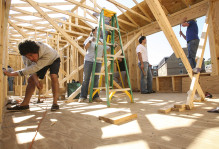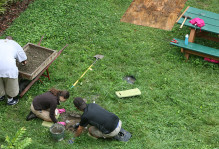Building Up the Tribe Family
When we began dreaming about offering the 7 Generations pre-orientation program here in the OCES, we had pretty big expectations: that students would learn in-depth about critical social issues, find ways to address them productively through service and long-term advocacy, and create a community with other incoming students who are working for social justice. Guess what? Our expectations were met – and in many ways, exceeded! The idea of “7 Generations,” inspired by an Iriquois proverb, is that incoming students would begin their time as members of the Tribe Family by looking back at those who have created social movements that brought us to where we are, and then looking forward to the effects of their actions far into the future – to the seventh generation beyond them.
Yesterday, 18 incoming students left campus after spending several days working with community organizations, sleeping on floors or in large loud rooms full of bunk beds, and engaging in three different social issues: Hunger in Our Communities, Sustainable Food Systems and People with Disabilities. Those addressing hunger worked here in Williamsburg and Richmond with many different food insecurity agencies; those learning about sustainable food systems partnered with Lynchburg Grows in Lynchburg, VA; and the third group stayed at Camp Baker, a program of the ARC of Greater Richmond, volunteering in a summer camp for people with disabilities.
They started the week with training on two major themes of our work: active citizenship, and the many faces and kinds of poverty. Then they piled their work gloves and sleeping bags into vans, and headed off for several days of sweat, laughter and deep thinking and critical reflection.
Each of the three groups came back to campus this past Saturday for what we called the “Now What?,” or reorientation, portion of 7 Generations. We had a cookout and their site leaders and I told stories about our work for social justice in a Story Telling event at the Crim Dell Amphitheater. (Then they cut loose and got a little spooked on a ghost tour led by W&M alumnus and grad student, Adam Stackhouse.)
Sunday morning, we gathered to hear what the 7G participants learned about hunger, food systems and people with disabilities. The groups presented skits, lists of lessons learned, monologues and cheers – each of which shed light on a different aspect of their social issue for the week. They pointed out how sustainable food systems are hard to access for people with low incomes, and how people with disabilities are often the first ones to be affected by state budget cuts. They told stories that showed how the issues they addressed overlapped: a mom in Williamsburg who was affected by a disability had trouble getting a job to support her children, while people with disabilities have the opportunity to volunteer, maybe for the first time, at Lynchburg Grows. We were moved by the stories we heard, and saw how the issues of food security, food systems and health are so interconnected for people living in poverty.
Finally, our 7Generations participants came up with plans for what they’ll do next to stay engaged with their issue and their new community of Williamsburg. What those plans look like: they’ll be shopping at the Williamsburg Farmers Market and cooking together, volunteering at Campus Kitchens at William and Mary to provide healthy meals for residents of public housing, and signing up to do a day of service together in October.
And of course, they’ll continue building up their own generation of the Tribe Family. Since we said our goodbyes twelve hours ago, Facebook has been lighting up with photos, wall posts and shared contact info for the two weeks until we all see each other again.



No comments.
Comments are currently closed. Comments are closed on all posts older than one year, and for those in our archive.